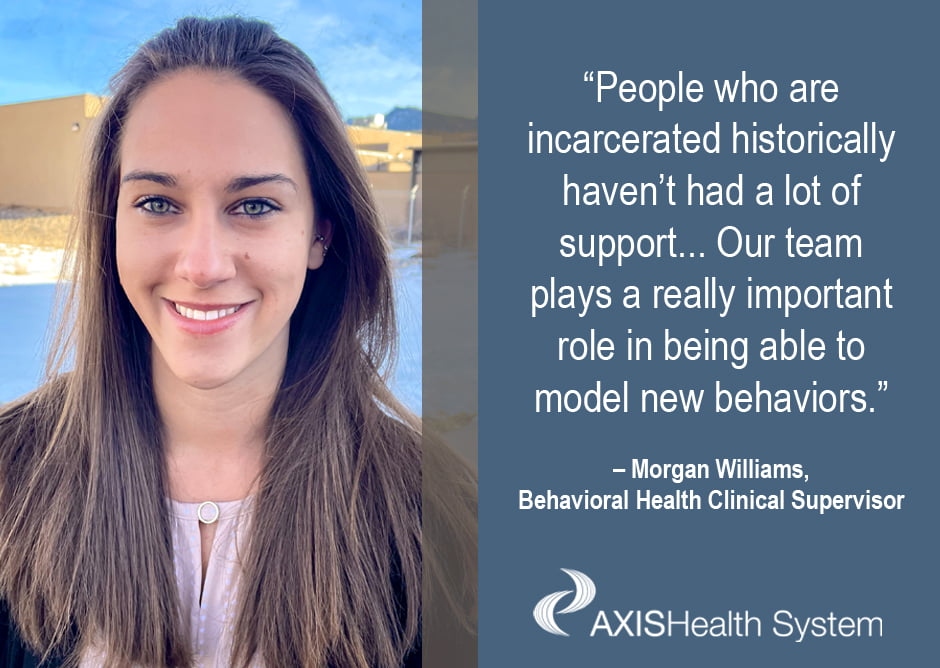People serving time in local jails can learn, grow and rebuild their lives. Axis Health System’s team of therapists, coaches and case managers are there to help them with two programs: Jail-Based Behavioral Health Services (JBBHS) and Jail Transitions (JT). One program helps them cope while inside the jail, and the other helps them adapt to a new life outside the jail after they are released. Both programs are supported with funding from the Behavioral Health Administration.
“People who are incarcerated historically haven’t had a lot of support,” said Morgan Williams, Behavioral Health Clinical Supervisor and team leader. “The lack of support and unhealthy influences play a part in their decision making. Our team plays a really important role in being able to model new behaviors.”
In-jail engagement
The JBBHS team helps inmates cope and recover while they are incarcerated in Montezuma, La Plata, San Miguel, and Archuleta County jails. Axis JBBHS services include assessments, individual therapy, group therapy, family therapy, skills-based learning, illness management recovery, intensive case management, pharmacological referrals, outreach and advocacy. Williams said the structured services are designed to build coping skills, reduce stress and recover from substance use and mental health.
“Our goal in the jail is to set them up for the next step in life,” she said. “Just because they’re incarcerated and may have made a bad choice doesn’t make them a bad person. They are doing their time and paying it back the way they are supposed to or awaiting trial. They’re still human.”
“We deal with a lot of difficult behaviors in the jail,” said Williams. “What our team is trying to do is offer tools to incentivize good behaviors from inmates.”
JBBHS is free and voluntary. “We can’t force anyone into care,” said Williams. She said she would not pull anyone into therapy or a group who didn’t want to talk to her. “We find a lot of people who are struggling in the jail just don’t want to participate – and that’s OK, too. We still make the effort to get in touch and make sure they’re doing OK, even if they deny our services.”
Wraparound after release
The second Axis program, Jail Transitions, is voluntary for people who are approaching release from the jails. It provides intensive short-term support. The goal is to surround the person with a “wraparound” network to reduce reoffending and reincarceration and improve mental health and substance use recovery.
Jail Transitions includes collaboration between the client, mental health providers, medical providers, probation officers, the court system and other community resources. The JT team sets participants up with therapy and intensive case management for needs such as housing, food and transportation. They work to continue skill building for coping, recovery and stress management.
“We don’t fix people. We support them,” said Williams. “It’s about learning how to cope and manage on an ongoing basis. It’s a lifelong process.”
She said many people leaving the jail are still on probation or parole or working through pre-trial services. They often have many legal requirements to fulfill. The team helps JT participants get organized and makes sure they are not reincarcerated because they missed a court date.
The JT team noticed one thing people needed to restart their lives after jail: a birth certificate. This vital piece of paperwork enables people to get a driver’s license, be eligible for residential substance use treatment, get a Social Security card and find employment and housing.
Seamless care
Jail-Based Behavioral Health Services and Jail Transitions are separate but connected. JBBHS does all the footwork up to the release, and then the JT team takes over.
“It’s a really great process to have two programs that work seamlessly together. They support getting people into traditional services when the time is right,” said Williams.
She said her favorite thing about her work in Axis jail services is “the little wins.”
“Getting to see them do things they didn’t ever feel like they were going to be able to do like, ‘I got my first apartment in a decade. I got my GED. I got a job. I got my 60-day chip of sobriety.’ These are the things that keep me going. I can count on those.”
Connect to services
Jail Transitions and outpatient services are available throughout the region. Medicaid is accepted, and a sliding-fee scale is available for those who qualify.
Axis accepts referrals for jail services from probation and parole officers, public defenders, sheriff and police departments, Department of Human Services, and other agencies. To make a referral, call 970.259.2162.
Axis Health System has a wide variety of healthcare and administrative positions. To see current openings, visit our digital job board. Axis is hiring professionals who want to make a meaningful difference in their communities. Some positions include hiring bonuses. If you are interested in a mission-driven healthcare job in beautiful Southwest Colorado, Axis Health System may be a great fit for you. To learn more, visit our website page Join Our Team.
BELOW: Axis Health System staff serving the La Plata County Jail stand in front of the jail on Jan. 12, 2022, from left: Ashley Birmingham, Jail Transitions Case Manager; Emily Riggs, Jail-Based Case Manager; Sarah Halls-Lucero, Peer Recovery Coach; Scott Johnson, Jail-Based Substance Use Disorder Therapist; Jodie Miller, Intern; Steven Girty, Jail Transitions Therapist; Chelsea Steck, Jail-Based Mental Health Therapist; Rick Jacobsen, Behavioral Health Manager; Morgan Williams, Behavioral Health Clinical Supervisor.




